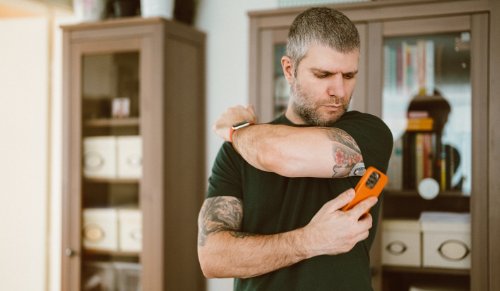Alex's story
Alex* is in his early 30s, works in information technology and is married with 2 young children. He has been living with type 1 diabetes for 15 years.
 When he was 17, Alex’s parents were concerned that he was drinking a lot of water, often felt lethargic and had lost weight. Alex went to see the family general practitioner and was sent straight to the emergency department at his local hospital. He was diagnosed with type 1 diabetes and spent the next week in the hospital’s paediatric ward where he was visited by a paediatric endocrinologist and dietitian.
When he was 17, Alex’s parents were concerned that he was drinking a lot of water, often felt lethargic and had lost weight. Alex went to see the family general practitioner and was sent straight to the emergency department at his local hospital. He was diagnosed with type 1 diabetes and spent the next week in the hospital’s paediatric ward where he was visited by a paediatric endocrinologist and dietitian.
The diagnosis was not a complete shock to Alex, as one of his close family members was living with type 1 diabetes. However, he largely kept the diagnosis to himself – not wanting to be defined by the condition. Alex says that he probably did not take the diagnosis as seriously as he should have when he was in his teens and early 20s. Gradually, though, he has come to realise the importance of monitoring his blood glucose levels, healthy eating, and regular exercise, both for managing his type 1 diabetes and his overall health and wellbeing.
Alex’s blood glucose levels have been steady for the last 4 years and he now self-manages his diabetes with a Flash Glucose Monitor (Flash GM) and visits to an endocrinologist every 6–8 months. The Flash GM enables him to monitor his blood glucose levels 24 hours a day without having to prick his finger to test his blood. The data are recorded on an app on his phone, and he receives notification warnings on his smart watch if the glucose levels change. Alex’s job requires him to have a commercial driver’s licence, so being able to monitor his blood glucose levels with such precision has been an important health and safety consideration to his employment. Alex appreciates the impact that new technologies have had for people with type 1 diabetes and looks forward to further developments in this area.
He says his awareness about his condition has improved greatly since his initial diagnosis. Alex's advice to others with type 1 diabetes is to exercise:
‘Exercise is good for everyone; it can help your diabetes. If I exercise the night before, it helps bring my blood glucose levels down for the next day … it has a flow-on effect … it helps your mental space and is good for your life in general.’
This case study is based on an interview with a person who is living with type 1 diabetes. This personal account is not necessarily representative of the circumstances of other people with type 1 diabetes or the challenges they may face, but it is our hope that it will give readers a greater awareness and understanding of the diversity of people’s experiences with diabetes.
The information provided does not contain medical advice – consult a qualified healthcare professional for guidance relating to your personal medical needs.
*Names and identifying characteristics have been changed. Images are not representative of individuals in the story.


